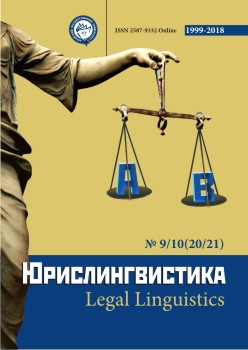USE OF LINGUISTIC EXPERTISE OF PHARMACEUTICAL NAMES (“ANTIGRIPPIN” CASE STUDY)
Abstract
The article is at the junction of two research fields: pharmaceutical naming and forensic linguistics. This is due to the fact that forensic linguistics includes not only legal but also linguistic aspects because the language is a means to express certain phenomena. The object of the research is one of the items on the pharmaceutical market. As this market keeps growing, there is always need in the nomination of a product so that it can be distinguished from all the rest. At the same time, the functioning of a pharmaconym is influenced by dynamic processes in the language, which in its turn may have a significant impact on protection of the name as an object of intellectual property. The article notes that, with various types of drug names defined by the law, the general criteria for all the types are uniqueness and lack of similarity with others in their spelling or pronunciation. However, since pharmaceutical naming and protection of the name as an object of intellectual property are matters of both linguistics and law, the article deals with practical application of linguistic knowledge to analyse the distinctive ability of a product name and to spot its transition to universal use, pointing out such cases as the “aspirin” lexical unit, with the product name no longer protected because of its becoming a generic name. The method of linguistic analysis is illustrated by the example of “antigrippin”, the word which is now undergoing the transition from a proper to a generic name. Using the case of “antigrippin”, we show that it is necessary to conduct a three-step linguistic study consisting of the analysis of lexicographic sources, the word structure, and the contextual use of the controversial naming unit.
Downloads
Metrics
References
Большой толковый словарь русского языка. Под. ред. С. А. Кузнецов. СПб., 2014.
Донскова Ю. В. Лингвистическая экспертиза установления различительной способ-ности коммерческого наименования (на примере словосочетания «умный крем»). Юрислингвистика. − № 6. 2017. − С. 79−88.
Дударева Я. А. Лингвистическая экспертиза товарных знаков. Кемерово, 2014.
Ефремова Т. Ф. Новый словарь русского языка. Толково-словобразовательный. М., 2000
Лексические трудности русского языка: словарь-справочник. Семенюк А. А. и др. М., 2000.
Морфемно-орфографичеикий словарь русского языка. А. Н. Тихонов. М., 2010.
Национальный корпус русского языка. URL: http://ruscorpora.ru/corpora-intro.html
Словарь русского языка: В 4-х т. Под ред. А. П. Евгеньевой. М., 1999.
Старженецкий В. В. Досрочное прекращение охраны товарного знака вследствие признания его обозначением, вошедшим во всеобщее употребление. 2004. URL: https://www.lawmix.ru/jude/2945
Толковый словарь русского языка конца XX века. Ред. Г. Н. Скляревская. М., 2001.
Толковый словарь современного русского языка. Гл. ред. В. В. Лопатин, Л. Е. Лопатина. М., 2009.
REFERENCES
The large explanatory dictionary of the Russian language. Edited by Kuz-netsov S.A. SPb., 2014.
Donskova Yu V. Use of linguistic expertise in asxertaining the distinctiveness of a trade name (“smart cream” case study). Legal linguistics. 2017. Vol. 6. Pp. 79−88.
Dudareva Ya. A. Linguistic examination of trademarks. Kemerovo, 2014.
Efremova T.F. The new dictionary of the Russian language. Explanatory and word-formation. M., 2000.
Lexical difficulties of the Russian language: a dictionary and a reference book. Semeniuk A.A. et al. M., 2000.
The morphemic-spelling dictionary of the Russian language. Tikhonov A.N. M., 2010.
Russian national corpora [Nazional'nyi korpus russkogo yazyka]. URL: http://ruscorpora.ru/corpora-intro.html
Russian dictionary: in 4 vol. Edited by Evgenieva A.P. M., 1999.
Starzhenetsky V.V. Early termination of trademark protection due to its recognition as a generic name. 2004. URL: https://www.lawmix.ru/jude/2945
The explanatory dictionary of the Russian language of the late XX century. Edit-ed by Sklyarevskaya G.N. M., 2001.
The explanatory dictionary of the modern Russian language. Chief editors Lopat-in V.V., Lopatina L. E. M., 2009.
Copyright (c) 2018 Юлия Викторовна Донскова

This work is licensed under a Creative Commons Attribution 4.0 International License.
The authors, which are published in this journal, agree to the following conditions:
1. Authors retain the copyright to the work and transfer to the journal the right of the first publication along with the work, at the same time licensing it under the terms of the Creative Commons Attribution License, which allows others to distribute this work with the obligatory indication of the authorship of this work and a link to the original publication in this journal .
2. The authors retain the right to enter into separate, additional contractual agreements for the non-exclusive distribution of the version of the work published by this journal (for example, to place it in the university depository or to publish it in a book), with reference to the original publication in this journal.
3. Authors are allowed to post their work on the Internet (for example, in a university repository or on their personal website) before and during the review process of this journal, as this may lead to a productive discussion, as well as more links to this published work (See The Effect of Open Access).











